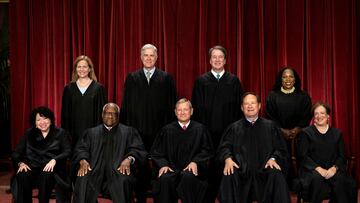What happens if the Supreme Court rules against Donald Trump in the ballot eligibility case?
The Supreme Court is set to hear arguments on whether Trump can stay on the ballot after two states decided that he is ineligible under the 14th Amendment.

The question of whether Donald Trump is eligible to be on the ballot in the 2024 presidential elecion for his role in the January 6 insurrection has been raised in nearly three dozen states. So far, in two states it has been decided that under Section 3 of the 14th Amendment he is disqualified from being president and that he should be removed from the ballot.
The Supreme Court is set to take up the issue on Thursday and the ruling could have major consequences for this year’s presidential election. Specifically, the high court justices will consider the decision handed down by the Colorado Supreme Court that said that Trump can be barred from the ballot because the former president had participated in insurrection. Maine’s Secretary of State also determined that Trump could not be on the ballot in the state but that is on hold pending the Supreme Court decision.
What happens if the Supreme Court rules against Donald Trump in the ballot eligibility case?
According to Trump’s lawyers, if the Supreme Court upholds the decision handed down in December that promises to “unleash chaos and bedlam” as other state courts and state officials could follow Colorado’s lead and exclude the presumptive Republican presidential nominee from the ballot in their respective states.
However, there are many ways in which the nine high court justices could decide. If it upholds the Colorado decision it would allow other states to take Trump off the ballot, but he wouldn’t be automatically kicked off the ballot nationwide.
It could kick the can down the road, finding a technicality about how the case was brought thus overruling the Colorado decision but teeing up another case for later this year. But that may be the case no matter what, with other cases pending across the country. According to the New York Times while the issue has been dismissed or rejected in 17 states there are at least 16 other states where a decision hasn’t been made on the issue of Trump’s eligibility to be on the ballot.
Questions before the Supreme Court in Trump’s ballot eligibility case
There are several issues at play regarding Trump’s eligibility in the 2024 presidential election. His legal team is arguing that the former president did not engage in insurrection, additionally, that he has not been convicted of any such offense.
Furthermore, even if that were so, they argue that Section 3 of the 14th Amendment does not apply to the President as the position is not specifically mentioned in the wording. This argument was rebuked in the Colorado decision with a conversation between the authors of Section 3.
Besides, they argue that the amendment says that it applies to those who take an oath to “support the Constitution of the United States” but that presidents swear to “preserve, protect and defend” the Constitution.
And even if it does apply to the office of president, there is nothing that says Trump cannot run for the office, but simple would be barred from being sworn in.
Follow all the latest news on AS USA.






